FW
Nitin Spinners has a number of initiatives underway for expanding its market share. A leading player in the textile industry, Nitin Spinners commenced its operations as a commodity yarn player and has now expanded its operations to value-added yarns. The company manufactures a range of yarns, including open-end yarns, multi-fold open end yarns, ring spun combed yarns, multi-fold ring spun yarns, compact yarns, fancy slub yarns, core spun yarns, S and Z twist yarns, dyeable cheese cones and organic cotton yarns and blends. Its product range in knitted fabrics includes single jersey, pique structures, inter-lock structures, rib structures and three thread fleece.
The company’s products are applicable for producing apparel and garments, under garments, terry towels, woven fabrics, home furnishings, carpets, denim, industrial textiles and medical textiles, among others. Further, looking forward to a promising growth in the apparel sector, the company has forayed into the finished fabrics segment, thus being equipped to cater to all fabric demands of apparel manufacturers. In the yarn segment, it is expanding its product range by introducing ring spun carded yarns and PC blended yarns. The company has always deployed the latest machines across its manufacturing operations that are automated to reduce the use of unskilled manpower, improve the quality of products and optimise power consumption.
Pakistan is drawing up a comprehensive textile policy with the aim is to increase the country’s share in world garment exports. Its small and medium sector will be promoted and developed. A task force will focus on facilities and incentives to attract investors to this sector. The task force will also work on the development of genetically-modified cotton seeds and ensure consistency in business policies.
Pakistan’s textile industry has become viable after a gap of 10 years, especially through the provision of regionally competitive energy tariffs. The industry witnessed a record 26 per cent growth in quantitative terms. The industry wants levies on cotton imports removed so that textile exports can go up. Exports fell one per cent during the last fiscal year as a strong negative price effect dominated the positive quantity effect. Exports, however, recovered 2.79 per cent in the July to August period of fiscal 2020. A special energy package was extended early this year to the erstwhile zero-rated industry to provide it a competitive energy tariff to expand and increase exports. The country’s textile exports constitute more than 60 per cent of total exports. Knitwear exports comprise 14.4 per cent of total exports. Readymade garment exports have a share of 12.5 per cent in exports. Bedwear has a 10.7 per cent share in exports.
Milan, Italy, recently hosted two events focused on street wear and the sneaker business - Plug-Mi and Sneakerness. Plug-Mi debuted in Milan as the first consumer-focused event dedicated to urban culture experience and street style fans. Sneakerness returned to Milan for the second time and recalled sneaker aficionados and resellers ready to buy and sell rare and special edition shoe models. Plug-Mi offers music entertainment and e-sport, while Sneakerness aims to make resellers and clients meet.
Milan is the ideal city for these of kind of events–both for its fame as a fashion city, and, especially for its size, as a draw for a very high number of people. Resellers are now part of the game, a game that has grown.
There is a lot of interest in street wear in Milan. There is also room for such events, not necessarily aimed at rich foreign tourists, who are only willing to buy designer brands. This project serves as an accelerator for new brands, but also for resellers. A B2C initiative like Plug-Mi wants to become a competitor of Pitti Uomo, although an event like Plug-Mi concerns only influencers and gamers. In other words, B2B events like Sneakerness have a clearer identity and purpose.
GU’s profits have jumped 75 per cent compared to last year. Fast Retailing, based in Japan, runs the better known Uniqlo. GU, an experimental and stylish brand, is Fast Retailing’s second clothing line. This brand sells at lower prices and is aimed at younger customers. GU's projected growth offers a diversified stream of revenue for the Japanese retail giant at a time when the fast fashion industry is struggling. Many teen brands have gone bust after failing to keep up with the shopping habits of younger consumers. Fashion franchises are struggling globally amid changing shopping habits and competition from e-commerce. In this past fiscal year, GU whittled down the number of items and started focusing on mass trends. Items such as oversized tees and marshmallow pumps have done particularly well in the past year.
GU’s success is built on Fast Retailing’s existing strengths, like its expansive supply network and scale. While GU has mostly focused on domestic growth, it’s opened a handful of stores around Asia in cities like Taiwan and Hong Kong. Fast Retailing has managed to turn around a second clothing line into a profit driver. GU accounts for about a tenth of the group’s operating profit.
The denim market in the US is more competitive than ever. The rise of athletic wear has not totally overtaken denim but it has fueled a more competitive market. Denim was scattered across the men’s spring 2020 shows, highlighting colored denim, bleach effects and classic trucker jackets. This not only bodes well for the staying power of denim but it also proves the consumer is still responding to the fabrication. While athleisure themes continue to rise and technical materials are soaring in popularity, there is still a customer that exists for both groups.
Madewell is currently among the top US denim brands. But only 19 per cent of Madewell’s revenue last year came from denim, with the rest coming from its combined other categories of apparel and accessories. Simultaneously, the last few years have seen consumers moving away from denim. Instead, customers, fueled by the rise of street wear, have embraced sweatpants, joggers and athletic leggings instead of jeans.
Some denim brands have adjusted to this shift by expanding their product range. One such brand True Religion known primarily for denim has pivoted to a more street wear inspired mix including other types of bottoms like sweatpants and joggers.
"The 15th edition of Interfilière Shanghai, which concluded on Sept. 27th, 2019, welcomed an exhilarating record numbers of visitors. The 2-day trade fair also welcomed 150 exhibitors, representing 15 countries and regions, with wider range of offerings from fibers, fabrics, lace, accessories, embroidery, OEM & ODM, machinery, textile designers, trend agencies to testing and certification institutions."
The 15th edition of Interfilière Shanghai, which concluded on Sept. 27th, 2019, welcomed an exhilarating record numbers of visitors. The 2-day trade fair also welcomed 150 exhibitors, representing 15 countries and regions, with wider range of offerings from fibers, fabrics, lace, accessories, embroidery, OEM & ODM, machinery, textile designers, trend agencies to testing and certification institutions.
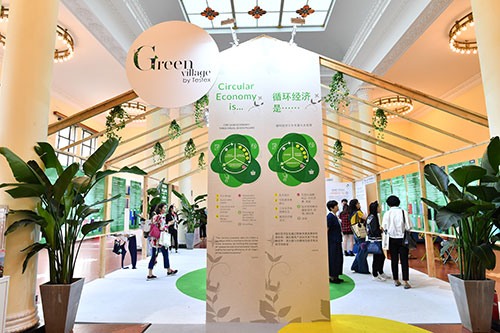
Sustainability continued to be the focal point of the show particularly highlighted by a new area – the Green Village sponsored by Testex, showcasing eco-products and eco -manufacturing processes presented by a selection of suppliers and four Indonesian partner manufacturers who are engaging in a Public Private Partnership project initiated by Eurovet, and developed and funded hand in hand with the German Federal Ministry for Economic Cooperation and Development (BMZ).
Visitors from Mainland China and Hong Kong China continued to top attendance at the show followed by Japan, South Korea and Taiwan Area China. Thailand bagged the sixth position in terms of visitor attendance, while United Stated experienced a slight decrease. Around 50 per cent of these visitors were from brands and the rest comprised of OEM, distributions, design offices, agents and media.
Interfeel Awards applauds material and manufacturing innovations
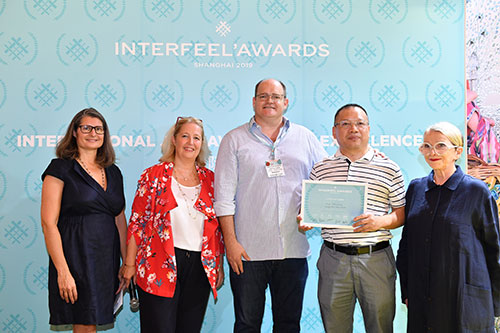
The sixth edition of Interfeel’Awards recognised the excellence and innovation of six material and manufacturing specialists who included Gayou International which was awarded with the Interfeel Award Lace; Asahi Kasei which bagged the Interfeel Award Natural; Seiren which won the Interfeel Award Interfeel’Award Solution Design. Libertytex which bagged the Interfeel’Award Surface Decoration; Hongxin Knitting which won the Interfeel’Award Shapewear and 3T Transfers which bagged the Jury’S Favourite Interfeel’Award.
Accolades for upcoming designer labels
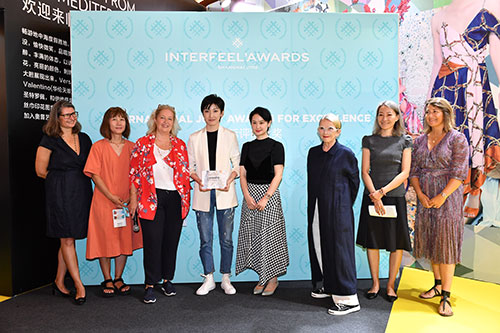
The 2nd edition of Young Label Awarded rewarded the up-and-coming young designer labels from Asia Pacific. On Sept 26th, 2019, the international jury announced the winners of the year which included the Chinese brands The Blender and Yalanka Newlife at the first and second position and Maimia at the third position.
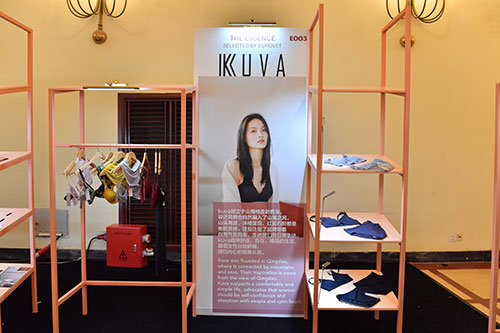
For the very first time, Interfilière Shanghai introduced The Essence, a curated area showcasing impressive collections by five domestic Chinese brands including Neiwai, Crème, Kuva, Coutoss And Sincere Heart. The “It’s Our Era” fashion show generated quite a buzz attracting KOLs, bloggers, media, industry players and the general public.
In a move designed to create a wider offering across the active and loungewear sectors, leading festival of fashion Pure London will launch Pure Body at the February 2020 show.
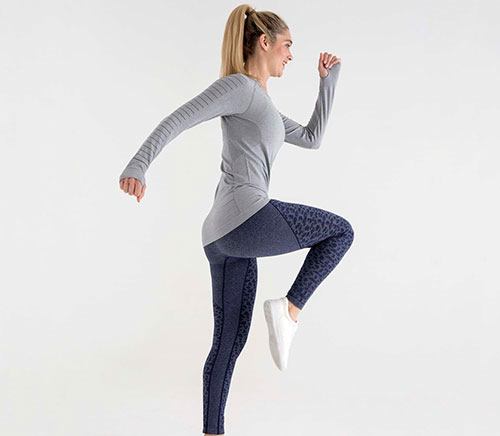
The new section will incorporate athleisure, nightwear, swimwear, lingerie, hosiery and will debut at the next show from February 09 -11, 2020 at Olympia London.

Alongside over 700 brands offering womens wear, menswear, footwear and accessories, young fashion, kids wear in Bubble at Pure London, ethical fashion in Pure Conscious and businesses from across the supply chain in Pure Origin, the February edition will present inspiring and educational content, keynote speakers and trend-led catwalk shows.
According to All Pakistan Textile Mills Association (APTMA), the textile industry in Pakistan is all poised to double exports in the next four years. It has strong balance sheets and an equity fund of US $ 1 billion earned directly from the international market. These funds can be leveraged to invest at least $ 4 billion in the next year alone.
The industry has achieved a record increase of 26 percent growth in quantitative terms although this did not directly reflect in the dollar amounts due to a substantial worldwide decrease in textile prices. However if this 26 percent increase in quantity had not been achieved the exports would have been less than $ 8.5 billion, the international prices have now recovered.
As per records, profits of the companies were over 5 percent. The companies have posted a turnover of $ 16 billion out of which $ 13.3 billion was exported and $ 2.8 billion were sold in the domestic market. Industry has contributed to the exchequer through income tax of Rs. 40 billion as well as various other indirect taxes and levies of over Rs. 35 billion. The importance of the industry can be assessed from the fact that it also employs over 10 million workers with many more dependents.
"Tailored Industry, Co-founded by Alex Tschopp, believes many knitwear brands today are forced to plan lengthy production cycles and undertake astronomically high order quantities which prevents them from launching new collections. Their chronic overproduction also results in vast quantities of unwanted apparel ending up in landfills which further compresses the company’s profit margins."
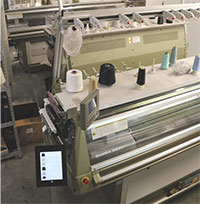 Tailored Industry, Co-founded by Alex Tschopp, believes many knitwear brands today are forced to plan lengthy production cycles and undertake astronomically high order quantities which prevents them from launching new collections. Their chronic overproduction also results in vast quantities of unwanted apparel ending up in landfills which further compresses the company’s profit margins.
Tailored Industry, Co-founded by Alex Tschopp, believes many knitwear brands today are forced to plan lengthy production cycles and undertake astronomically high order quantities which prevents them from launching new collections. Their chronic overproduction also results in vast quantities of unwanted apparel ending up in landfills which further compresses the company’s profit margins.
The company believes it is time to set a new paradigm in knitwear production by mixing hardware and software for an efficient and flexible output. Tailored Industry already raised $650,000, and plans to further raise another $1or $2 million through seed funding. This will help it to triple its five-person team over the next year by onboarding additional engineers, programmers and operators to keep its 10 Shima Seiki 3D knitting machines running smoothly.
A full-service solution from apparel production
The Brooklyn facility of the company manufactures around 1,000 to 2,000 units of knitwear apparels every month. It produces a range of styles including sweaters, dresses, beanies, cardigans, blazers, tops, scarves and knit ties. It is building a cloud-based manufacturing platform to rapidly restock products “with very low risk in their inventory.
month. It produces a range of styles including sweaters, dresses, beanies, cardigans, blazers, tops, scarves and knit ties. It is building a cloud-based manufacturing platform to rapidly restock products “with very low risk in their inventory.
The company’s software facilities include a Shopify store that helps it to review order data for a new products, execute production and ship finished goods to customers in as little as five days. Its high-tech 3D-knitting machines reduce production waste, generating roughly 1 percent of the excess relative to other manufacturing techniques. The company offers a full-service solution for everything from yarn sourcing and knitting to finishing, packing and shipping. Its design template gives its clients new ideas while launching their designs if they don’t already have a style in mind.
Expanding its production model
Tailored has executed a pilot order for Gap Inc.’s new Hill City men’s active band—which could serve as a guinea pig for the Gap umbrella. As the company is being flooded with orders, it now plans to add 12 more knitting machines to its Brooklyn facility. However, its immediate plan includes opening a 100-machine factory in Brooklyn and expanding the lean production model to other close-to-customer regions surrounding the US coastline as it aims to make this location a model factory for other brands to emulate.
The British luxury group Stella McCartney has appointed as new CEO Gabriele Maggio, former general manager at Moschino and with a professional career in Gucci and Bottega Veneta. He has a long career in the fashion industry. Besides working in Moschino, Maggio has held roles in Gucci and Bottega Venetta, both owned by Kering. He will join his position on October 21 replacing Frederick Lukoff leaving the company in June to join Scotch & Soda as CEO.
Maggio joins a couple of months after the company signed a deal with LVMH. The luxury holding bought a stake of the designer’s company last June after Stella McCartney ended its 15-year-old relationship with Kering. The goal of this partnership is to accelerate Stella McCartney’s worldwide development in terms of business and strategy, while of course remaining faithful to its long-lasting commitment to sustainable and ethical luxury fashion.
As part of the deal, Stella McCartney joined the managing team at LVMH as consultant for Bernard Arnault in terms of sustainability. Arnault appointed that this was a decisive factor for the acquisition.
Stella McCartney held a 50-50 joint venture with Kering until last year, when the designer bought back 100% of the company. The move was also part of Kering divestment in non-strategic businesses to focus on Gucci and fast-growing brands like Saint Laurent and Bottega Veneta.












